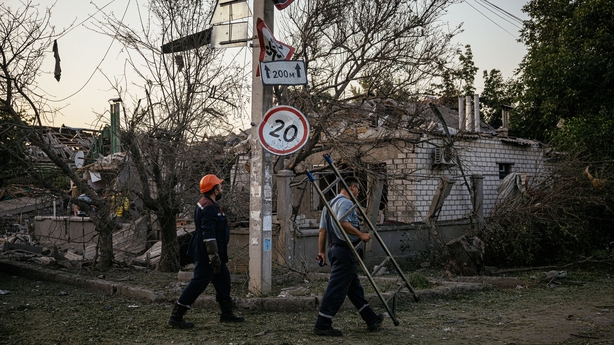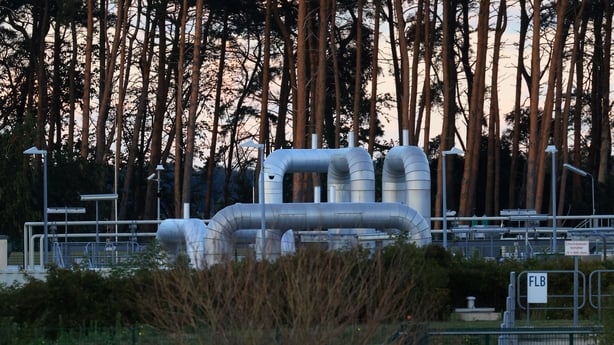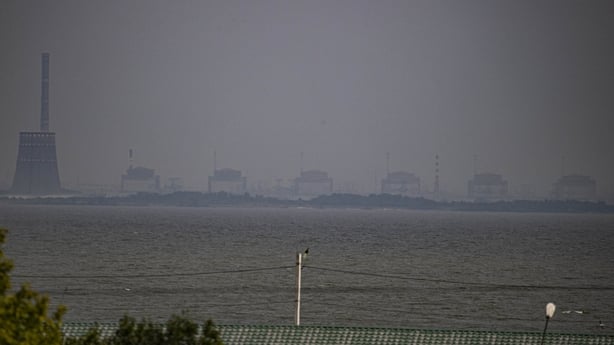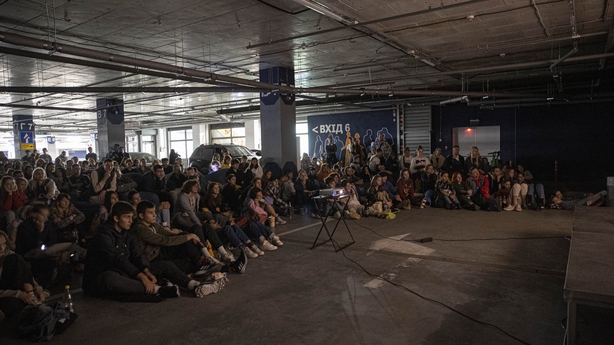Ukraine's Zaporizhzhia nuclear power plant's last working reactor has been switched off from the grid after the facility was disconnected from its last remaining power line due to shelling, the plant's operator said.
"Power unit (reactor) No. 6 was shut down and disconnected from the grid" because of a fire that was "triggered because of shelling" according to an Energoatom statement.
It comes as European leaders sought to ease the impact of high energy prices across the continent after Ukrainian President Volodymyr Zelensky warned of a difficult winter.
French President Emmanuel Macron, following a phone call with Mr Zelensky, said that the only way to restore security at the occupied Zaporizhzhia nuclear plant in Ukraine was via withdrawal of Russian troops, the Elysee palace said in a statement.
Three strong explosions were heard in Energodar, the curfew-bound city where the plant is located, but there were no immediate details of damage and casualties, Russia's official TASS news agency said this morning.
Ukrainian troops made two attempts to deploy assault teams in the vicinity of the city, it said, adding that they were using drones, heavy artillery and rocket launching systems.
Russian troops seized the plant shortly after President Vladimir Putin sent his army over the border on 24 February. It has become a focal point of the conflict. Each side has blamed the other for shelling that has raised fears of a nuclear disaster.
Vladimir Rogov, a pro-Russian official in the Zaporizhzhia region, told Komsomolskaya Pravda radio that there had been no shelling or incursions, and that IAEA experts were expected to work at the plant until at least today.
Last week an IAEA mission toured the plant, which is still operated by Ukrainian staff, and some experts have stayed there pending the release of an IAEA report.
Russia has resisted international calls to demilitarise the area.
In his nightly remarks yesterday, President Zelensky thanked his forces for taking two settlements in the south and a third, along with additional territory, in the east, citing "good reports" from his military commanders and intelligence head.
Kyrylo Tymoshenko, deputy head of the president's office, earlier posted an image of soldiers raising the Ukrainian flag over a village he said was in the southern area that is the main focus of the counter-offensive.
"Vysokopillya. Kherson region. Ukraine. Today," Mr Tymoshenko wrote on Facebook over a photograph of three soldiers on rooftops, one of them fixing a Ukrainian flag to a post.
Ukraine began the counter-offensive last week targeting the south, particularly the Kherson region, which Russia seized early in the conflict.

After Ukrainian forces' intense shelling of clusters of Russian troops in the region, the Russians have banned movement of residents, forbidding them to cross the Dnipro River, the Ukrainian general staff said today.
Russia has launched 25 missile strikes, and more than 22 airstrikes, on military and civilian targets in Ukraine in the last 24 hours, the statement added, keeping up its focus one stablishing full control over the Donetsk region.
President Zelensky's remarks came a day after he warned Europeans that Russia was preparing "a decisive energy blow" during the cold months ahead.
Moscow has cited Western sanctions and technical issues for the energy disruptions. European countries, which have backed Kyiv with diplomatic and military support, have accused Russia of weaponising energy supplies.
Some analysts say the shortages and a surge in living costs as winter approaches risk sapping Western support for Kyiv as governments try to soothe disgruntled populations.
The Kremlin said today that the halt of gas deliveries to Germany via the Nord Stream pipeline was caused by Western sanctions that prevent the maintenance of its infrastructure.
"Problems with pumping (gas) arose due to sanctions that were imposed against our country," Kremlin spokesman Dmitry Peskov told reporters.
Last week Moscow said it would keep closed the Nord Stream 1 pipeline, its main gas channel to Germany, while G7 countries announced a planned price cap on Russian oil exports.

The Kremlin said it would stop selling oil to nations that adopted the cap.
German Chancellor Olaf Scholz said yesterday his government had been planning for a total halt in gas deliveries in December, promising measures to lower prices and tie social benefits to inflation.
"Russia is no longer a reliable energy partner," Mr Scholz told a news conference in Berlin.
In response, former Russian President Dmitry Medvedev accused Germany of being an enemy of Russia.
"In other words, it has declared a hybrid war on Russia," he said.
On yesterday, Finland and Sweden announced plans to offer billions of dollars to power companies to avert the threat of insolvency amid the crisis.
Separately, the US embassy in Moscow said John Sullivan, the ambassador appointed by former President Donald Trump in 2019, had left his post and was retiring. A State Department official said Mr Sullivan had served a typical tour length.

On other battlefronts, Ukrainian Telegram channels reported explosions at the Antonivsky bridge near the city of Kherson, occupied by Russian forces.

Ukrainian missiles have severely damaged the bridge over the past weeks, but Russian troops were trying to repair it or to set up a pontoon crossing or barges to maintain supplies to their units on the right bank of the Dnipro River.

